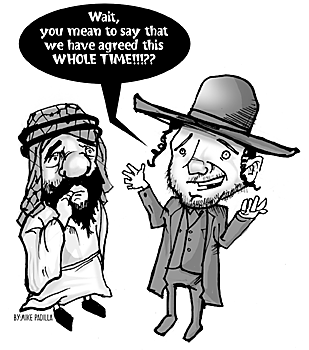
Illustration by Mike Padilla
|
|
By Jonathan Riches
Arizona Daily Wildcat
Monday, April 11, 2005
Print this
As a young child who probably asked too many questions, I used to probe my mother about the metaphysical: "Which religion is the 'right' one?" "Do people from all religions go to heaven?" I always received the same reply: "Religion is made by man. It is your spirit that counts."
Many years later I learned what my mother meant. The value of religion does not lie in individual religious dogmas. Instead, the value of religion derives from the virtue that it seeks to build and from the spiritual development that it attempts to foster.
This enlightened thinking came from a woman whose father was a minister in a small Wisconsin town where the church played a large role in the lives of its residents. For her, it was unusual to challenge the authority of organized religion and for most university students it is not. In fact, most Americans appear leery of religious authority.
In a recent poll conducted by The Harris Poll and published in The Wall Street Journal Online, only 27 percent of Americans claimed that they had a "great deal" of confidence in the people in charge of running "organized religion." In contrast, 79 percent of Americans claim they "believe in God," according to a poll taken by the same company. So, while four out of five Americans profess that they believe in a higher power, only one if four have considerable confidence in religious leaders. What, then, can explain this discrepancy, particularly in light of the huge emotional outpouring that the passing of Pope John Paul II produced among so many across this country?
There are literally thousands of reasons why people - particularly young people - are apprehensive about religion. The first reason is probably youthful skepticism. Young people, as a general rule, have long periods of doubt and unbelief; they challenge authority (any authority) that seeks to restrain their quest for an identity. They not only ask questions, but questions seem to ask themselves. But youthful cynicism is healthy. Only through a process of interrogatories and criticisms can people fortify their resolve and find faith in anything.
Perhaps a more pragmatic reason why people are suspicious of religious authority is because of the violent history of the world's religions. I shudder to think of how many people have been killed in the name of religion. Indeed, present-day conflicts in Israel, the Balkans, Kashmir and Northern Ireland (among many others) find their roots in religion. But evil perpetuated in the name of religion should not make us assume that religion itself is evil. Surely it is those individuals who manipulate religious doctrine to fit their socio-political agendas (and not the religion per se) that are the source of conflict among religious peoples and nations.
Finally, there is a certain arrogance to the idea that one religion is the "proper" religion, the "right" religion, "the way." Either the Sabbath is supposed to be celebrated on Saturday or it is supposed to be celebrated on Sunday. Either people should abstain from pork or they should not. Either we are born with original sin or we are born pure. The point is that different religions (and different sects of the same religion) maintain different beliefs. But it seems highly unlikely that any one religion or any sect of any particular religion maintains an absolute monopoly on the truth. Instead, it seems much more likely that different ideologies all consist of fragments of the truth, arbitrarily wretched from the truth. Still, the amazing thing about the world's different religions is this: If one were to gather all these seemingly conflicting ideologies and beliefs together and distill them of their fundamental tenets, one would be left with a moral code that is surprisingly similar.
Every major religion, in fact every single civilization in the history of mankind, has shared shockingly similar values. Each prominent religion has told its adherents to be honest, just, courageous, moderate and kind. The world's religions celebrate charity, faith and virtue, while they discourage selfishness, cowardice and injustice. Moreover, what religion has cheered a man for rape and murder, or what civilization has praised a man for cowardice in battle? The answer is none. And the reason is that despite petty differences and dogmatic disagreements, the world's religions essentially cherish the same things. Religion tells us to work, to play, to love, to think, to laugh, to do good, to be kind and just. Christianity captured the idea in one golden rule: Do to others what you would like done to yourself. While some religions cannot agree on many things, they can all agree on this.
And isn't that the whole point anyway? Religion may have its drawbacks, and religious dogma may seem distasteful, but particular religions can help us live out the values that most of us share. They can give us a community in which to practice those values and a support network should we fall short of them. It is true that religion may be used for bad ends, but the ends of religion are certainly not all bad.
Jonathan Riches is a first-year law student. He can be reached at letters@wildcat.arizona.edu.
